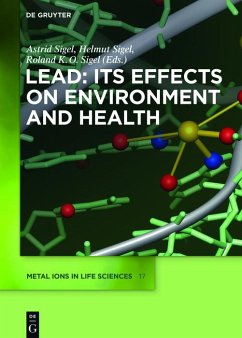Volume 17, entitled Lead: Its Effects on Environment and Health of the series Metal Ions in Life Sciences centers on the interrelations between biosystems and lead. The book provides an up-to-date review of the bioinorganic chemistry of this metal and its ions; it covers the biogeochemistry of lead, its use (not only as gasoline additive) and anthropogenic release into the environment, its cycling and speciation in the atmosphere, in waters, soils, and sediments, and also in mammalian organs. The analytical tools to determine and to quantify this toxic element in blood, saliva, urine, hair, etc. are described. The properties of lead(II) complexes formed with amino acids, peptides, proteins (including metallothioneins), nucleobases, nucleotides, nucleic acids, and other ligands of biological relevance are summarized for the solid state and for aqueous solutions as well. All this is important for obtaining a coherent picture on the properties of lead, its effects on plants and toxic actions on mammalian organs. This and more is treated in an authoritative and timely manner in the 16 stimulating chapters of Volume 17, which are written by 36 internationally recognized experts from 13 nations. The impact of this recently again vibrant research area is manifested in nearly 2000 references, over 50 tables and more than 100 illustrations (half in color). Lead: Its Effects on Environment and Health is an essential resource for scientists working in the wide range from material sciences, inorganic biochemistry all the way through to medicine including the clinic ... not forgetting that it also provides excellent information for teaching.
Dieser Download kann aus rechtlichen Gründen nur mit Rechnungsadresse in A, B, BG, CY, CZ, D, DK, EW, E, FIN, F, GR, HR, H, IRL, I, LT, L, LR, M, NL, PL, P, R, S, SLO, SK ausgeliefert werden.


